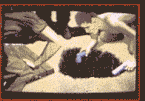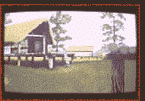|
Q: Were you content with
the finished game? Anything you wanted to add back then that didn`t make
it into the release-version?

A: Only in parts. The
game was a shadow of what it was meant to be. Ocean made us take out
interrogation scenes, deeper sub-games, more movie sequences and all
kinds of things, leaving the game as just a shell. I'd like to revisit the
game now and try to do a far better, more accurate title that would, I
hope, terrify the player as much as being a real soldier back then would.
Q: What was it like
seeing the finished game in stores around europe? How was the feedback to
the game like (hmmm, positive I guess)? Since the game is well known, was
it a commercial success? Do you know how many units were sold?

A: We may never
truly know whether it was a commercial success or not, but I think it was
- we just never benefited from it. It was great to go into shops in London
and see it on the shelves though. After all that hard
 work it was very odd,
very surreal to see it finished. The magazines pretty much as a whole gave
the game good reviews, but I remember one reviewer (an anoying little sod
that I can never remember the name of - Gary something...), I think at 'The
One' magazine. At the time we were responsible for much of our own PR, so
took the game round the mag's ourselves. The reviewer called us in to demo
the game, saying that it was too hard for him and he was making no headway
and couldn't get past the sub-games. So I spent the afternoon showing him
how to play it. When the review he wrote came out he said that he'd found
the game disappointingly easy and gave us a 4 out of 10 or something....! work it was very odd,
very surreal to see it finished. The magazines pretty much as a whole gave
the game good reviews, but I remember one reviewer (an anoying little sod
that I can never remember the name of - Gary something...), I think at 'The
One' magazine. At the time we were responsible for much of our own PR, so
took the game round the mag's ourselves. The reviewer called us in to demo
the game, saying that it was too hard for him and he was making no headway
and couldn't get past the sub-games. So I spent the afternoon showing him
how to play it. When the review he wrote came out he said that he'd found
the game disappointingly easy and gave us a 4 out of 10 or something....!
Q: Why was 'The Lost
Patrol' Shadow Developments only release? Why did you split up (damn, I
always wanted to see a sequel...)? Were there more games planned or did
you work on other games? Why did you leave the game industry?

A: We wanted to
move into other types of games that were becoming popular at the time and
had designs and
graphics for another 4 titles or so. One of them, 'Flag'
showed real promise, but as it was too original for its time, it was
pulled before we could complete it. Shadow 'closing' happened over a few
years as time changed and we realised that without a half million pound
budget and a massive team behind us, publishers would no longer consider
our work. Neither Simon nor myself wanted to take the step into opening a
'real' publishing house (life is far too short!), so we had to stop. We
still talk about game ideas from time to time, but the software industry
has changed so much now we probably have little chance of developing them.
Simon still works in the industry, but after a couple of years as a games
journalist/ sub-editor and a couple more years in PR I decided that I
wanted to try other things other than graphics - it's a very demanding job
and the burnout rate is very high. Over the years I've worked on about 30
games since Lost Patrol: Zool arcade version, Cybermorph, Hero Quest,
etc....all great fun. But there's been little demand for hand drawn
graphics for a long time, and it's only starting to come back now with the
advent of mobile phone gaming.
Q: Talking about the good old times, what are your feelings when
remembering those days? Any thoughts about the game-market and computers
(Amiga) in generall back then compared to today?

A: They were great times.
Damned hard work, but I Ioved every minute of it. Very few modern games
have inspired me I have to say. I think I can get more out of 'Mr Do' than
most of the titles on sale at present. When I
 was involved in
PR one part
of my job required me to go to publishers and tell them what I thought of
their new titles and estimate
what kind of scores they would get. Most, 9
out of 10, were actually appalling, despite having months of development
and tens of thousands of pounds thrown at them. They failed really because
the basic game premise wasn't strong enough, and they hoped that by keep
adding on gaming extras they could turn them into something decent. But a
good story line or a vague idea about gameplay isn't a good reason to
begin development. If they'd just put more thought into the planning and
ideas stage, most could have saved themselves literally millions of pounds. was involved in
PR one part
of my job required me to go to publishers and tell them what I thought of
their new titles and estimate
what kind of scores they would get. Most, 9
out of 10, were actually appalling, despite having months of development
and tens of thousands of pounds thrown at them. They failed really because
the basic game premise wasn't strong enough, and they hoped that by keep
adding on gaming extras they could turn them into something decent. But a
good story line or a vague idea about gameplay isn't a good reason to
begin development. If they'd just put more thought into the planning and
ideas stage, most could have saved themselves literally millions of pounds.
In many cases though, games that I said were truly abysmal were still
brought out (remember Microids 'football' game?) and cost the companies
involved dearly. They just didn't want to hear the truth. But I have to
say that nowadays most publishers think of games as just a technical
process - with artists and programmers a necessary evil they have to bear
- and that if they get all the mechanics of the game right then gameplay
will follow. But no strong core gaming theme, no game.
Q: Is there maybe a chance for us to enjoy another game with your graphics
again someday (don`t say no, please!)?

A: I'd love to, but to
be honest there are very few games that use bitmap screens anymore, it's
mostly all 3D stuff and that doesn't appeal to me in the same way as
actually drawing something. I'm looking into maybe doing some phone games,
I've got a lot of graphics already done for ideas for new games I've had
over the years, It would be nice to do some of these ideas. I'm still open
to offers!:)
Q: Ok, final question:
What do you think about making a website dedicated to a 14 years old game?
Crazy? Stupid? Cool? ;-)

A: Flattering and cool
to be honest! Around the time of bringing the game out we got a little
publicity and it sold well, but I never heard of anyone expressing much
interest in it even 6 months later. I had no idea that it had many sales
in Europe or how it had been received (though I did get an award for the
graphics from a French Magazine).
That anyone should even care about it now is pretty amazing. I just wish
we'd been able to make the game as it was meant to have been, maybe more
people would be interested.

Again, Ian, thanks a lot for spending your time on this interview and all
the best wishes for your future!
|